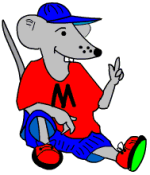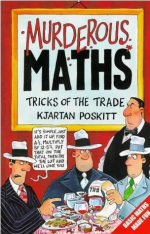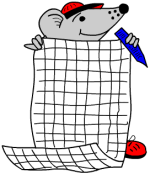A commendable idea: to collect a variety of free games and activities from different sites which can be used for teaching maths in school or at home. Organised into 9 categories:
Use and apply maths
Count and understand
Number facts, add and subtract
Number facts, multiply and divide
Calculating, add and subtract
Calculating, multiply and divide
Shape
Measuring
Handling data. Continue reading “Mathszone: web review”
Maths worksheets: Grouping and counting. Y3
 One more maths worksheet with sets of objects to help with counting larger numbers. It is always a good idea to ask for an estimate of the whole amount before starting. Young children only have a limited concept of larger numbers – it can be 1, 2, 3, 4, lots! Grouping into fives or tens helps – but only when children have learned to count up in fives or tens. I would still recommend plenty of practical practice – eg putting a pack of cards into piles of 5 or ten.
One more maths worksheet with sets of objects to help with counting larger numbers. It is always a good idea to ask for an estimate of the whole amount before starting. Young children only have a limited concept of larger numbers – it can be 1, 2, 3, 4, lots! Grouping into fives or tens helps – but only when children have learned to count up in fives or tens. I would still recommend plenty of practical practice – eg putting a pack of cards into piles of 5 or ten.
The second page is a set of number lines to complete, filling in the spaces. Some of these are tricky because they cross the hundreds boundary eg counting on 6 from 97. Make sure your child is confident with counting below 100 before attempting this. Of course it is relatively easy for you to create a number line to put numbers on and to practice counting up and down, and don’t forget snakes and ladders and other dice games which involve counting.
It is always a good idea to listen carefully to your children when they count up to 100 and beyond. Often they will miss whole sets of tens out to begin with. Remember those games of chase you used to play when you had to count to 100 first – now you know why some of your friends managed it so quickly!!
News: More male teachers needed in schools
more male teachers needed in schools
Well it was only a short while ago when I mentioned a piece of research which suggested it was not necessary to have male teachers in primary school. Yes, you’ve guessed it, another survey (the Yougov survey) recommends more men should be teaching in our primary schools. They say that it leads to better behaved boys. Continue reading “News: More male teachers needed in schools”
What is expected of children? Part 4: Year 2
maths at home, counting, understanding number, knowing maths, shape, measuring, data handling,
What is expected of children during their primary school years in England?
Year 2 ( aged 6/7)
Let’s continue by looking at the expectations for children at the end of year 2 (6 to 7 years old). This is a year where a huge amount of new maths is introduced. However, it is still important to keep the maths in a practical context using real life situations. One of the most important developments is that children are expected to work with larger numbers, up to 100 and whole hundreds. Partitioning (or splitting numbers) is introduced with questions such as 36 = ? + 6.
Remember to look at the year 1 expectations to see the progression. Continue reading “What is expected of children? Part 4: Year 2”
Maths worksheets: Count in steps of one. Y2
Maths worksheets: Count in steps of one.
 Here we have some practice at filling in number lines using two digit numbers. Some of the numbers have already been written in. Notice that the number line has the lowest number at the bottom – and the numbers are completed in ascending order. It is interesting to watch how children do this; most will fill in from a number already there and prefer to count up rather than count down.
Here we have some practice at filling in number lines using two digit numbers. Some of the numbers have already been written in. Notice that the number line has the lowest number at the bottom – and the numbers are completed in ascending order. It is interesting to watch how children do this; most will fill in from a number already there and prefer to count up rather than count down.
A superb practical experience is to play snakes and ladders which has all the ingredients of counting on and going back down the snakes. Large floor game boards are great! Make sure you count out loud when it is your go. Other dice board games are also excellent as counting practice.
What is expected of children? Part 2: Reception
What is expected of children during their primary school years in England?
Part 2: Reception 4/5 years old
Let’s begin by looking at what is expected by the end of the Reception year – that’s children aged between 4 and 5 years old. This is sometimes called the Foundation Stage. Yes, even our 5 year olds have targets to reach!
I will take each of the strands in turn, but as you go through them it will become clear that the most important thing of all is to talk with your children and use the vocabulary of simple maths to help them describe the world around them. Continue reading “What is expected of children? Part 2: Reception”
The Essential Arithmetricks: Book review
The Essential Arithmetricks review, murderous maths review
 The Essential Arithmetricks (Murderous Maths)
The Essential Arithmetricks (Murderous Maths)
Now, how serious do you like your maths?
‘Not very much!’
OK then the Murderous Maths series might be right up your street.
I have taken my favourite of the series: The Essential Arithmetricks featuring Pongo McWhiffy amongst many others, who guide you through the complexities of arithmetic – including awful addition, sickly subtraction, terrible tables, maddening multiplication and diabolical division. Yes, they do like their alliteration. It also includes all the signs you will need to use and pages on place value, estimation and manipulating equations.
Almost mad, but in fact there are plenty of really useful tips on how to improve mental arithmetic, all set out in a fun way with amusing characters and illustrations. Your children will either love it or hate it!
Written by Kjartan Poskitt.
| Interest | ||
 |
||
| Maths content | ||
 |
||
| Value for money | ||
 |
||
Free Y1 maths worksheets: Count in steps of one.
free maths worksheet counting in ones
 Two more maths worksheets to help with counting. Children need an awful lot of practice at counting. To begin with they will probably touch each picture as they count up. Try counting the same set of cakes, but starting from a different cake. Colour the cakes in two different colours and count how many of each colour – this helps with early addition. The more you can do the better – make collections of cuttings from magazines of animals, food, cars etc and create a scrapbook. Count the number of pictures. Nothing wrong with using fingers to count on – most people do it!
Two more maths worksheets to help with counting. Children need an awful lot of practice at counting. To begin with they will probably touch each picture as they count up. Try counting the same set of cakes, but starting from a different cake. Colour the cakes in two different colours and count how many of each colour – this helps with early addition. The more you can do the better – make collections of cuttings from magazines of animals, food, cars etc and create a scrapbook. Count the number of pictures. Nothing wrong with using fingers to count on – most people do it!
Maths worksheets: Probability. Y6
probability scale 0 to 1
 The language of probability develops further in year 6 to include:
The language of probability develops further in year 6 to include:
perhaps, might, fair, unfair, biased, random, likely, unlikely, equally likely, chance, certain, uncertain, probable, possible, impossible, good chance, poor chance, no chance, equal chance, even chance, evens, fifty-fifty chance, likelihood, probability, possibility, and, or, not.
Children should understand the probability scale from 0 to 1 and be able to put events in the appropriate place on the probability scale according to the likelihood of the event happening. A probability of 0 means that something is impossible. A probability of 1 means that something is certain to happen. Sometimes children think that some events have a probability of 0 or 1 when in fact they are quite near these values, but not actually 0 or 1. For example it is highly unlikely that we shall have built a bridge across the Atlantic Ocean by the year 2030, but this is not actually impossible, therefore the probability of it happening is extremely small, but not equal to zero. Likewise, the probability of the Sun rising as usual every morning for the next year is very high but not actually 1 as there is a very small chance of some cataclysmic event happening in the Solar System.
Two maths worksheets below look at the probability line from 0 to 1.
Maths worksheets: Probability. Y5
Probability, certain, likely, unlikely, impossible
 Probability brings with it a whole new set of vocabulary and concepts. By the end of year 5 children should be familiar with the following terms:
Probability brings with it a whole new set of vocabulary and concepts. By the end of year 5 children should be familiar with the following terms:
perhaps, might, fair, unfair, likely, unlikely, equally likely, chance, certain, uncertain, probable, possible, impossible, good chance, poor chance, no chance, equal chance, even chance, evens, fifty-fifty chance, likelihood, probability, possibility.
The two worksheets below concentrate on children being able to say whether events are impossible (such as cows giving birth to hens), unlikely (such as tossing a die and getting a 4), likely (such as waking up tomorrow) or certain (such as throwing a normal die and getting a number from 1 to 6). Finding events which are either certain or impossible are often much harder than you might think.
 Mathszone.
Mathszone.